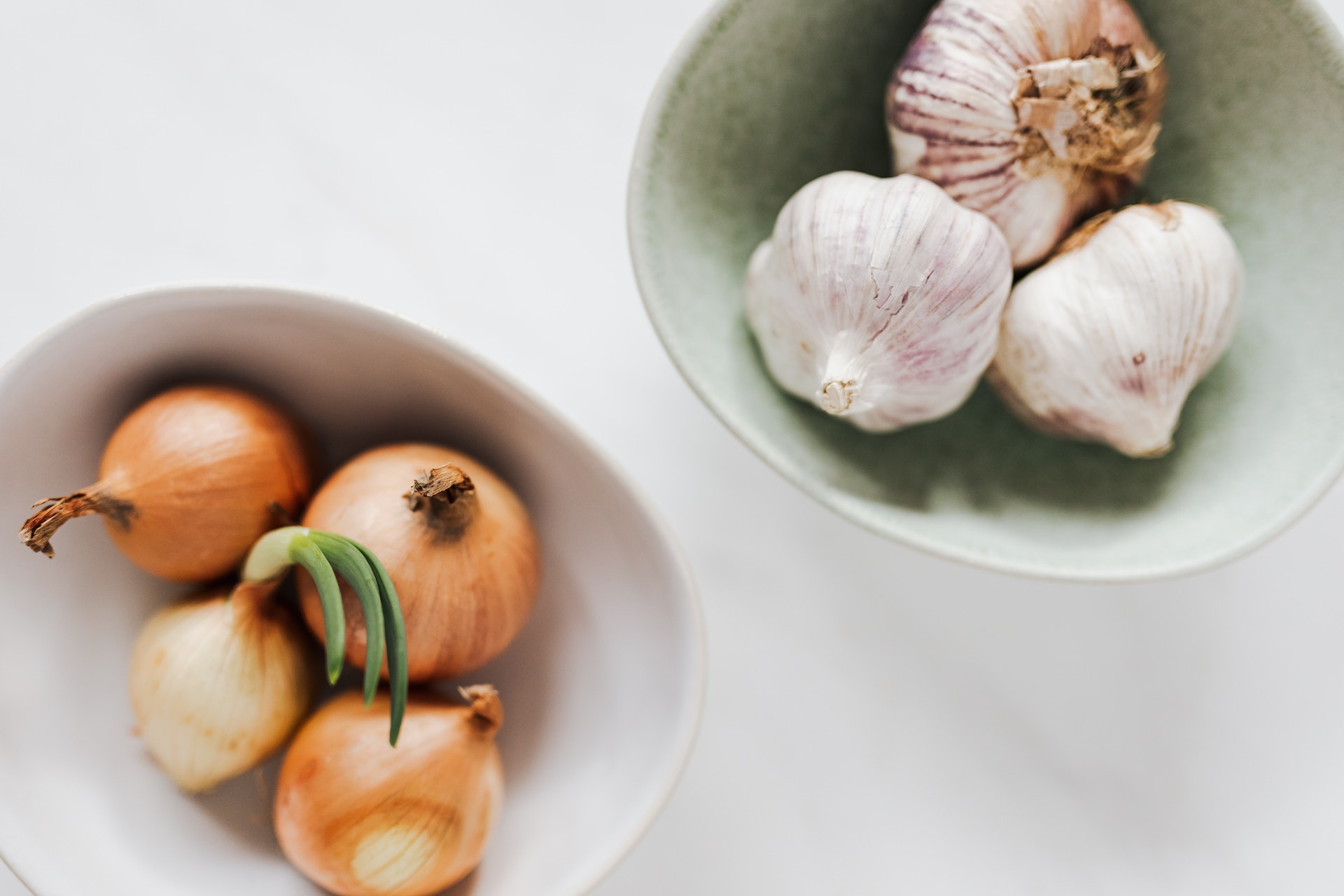Garlic and onions are used a lot in cooking to season and flavor food and enhance the taste. They are one of the most important ingredients that add flavor and delicious aroma to dishes in various types of meals.
Onions and garlic are used in various kitchens around the world.
Which makes it difficult to avoid them in cooking, but their strong effect on the stomach may cause many problems.
Effects of onions and garlic on the stomach
Onions of all colors are a good source of vitamins C and B6, potassium and folate, and garlic is rich in vitamins C and B6, thiamine, potassium, calcium, phosphorus, copper and manganese, and they are low in calories.
However, one of the most prominent warnings and contraindications to onions and garlic is that they contain a high percentage of "FODMAPs", which are "short-chain" carbohydrates such as sugars and fibers that some people's intestines cannot absorb well.
A report in the American magazine “Time” attributes to experts in nutrition and public health saying that consuming a lot of “fodmap” compounds can cause bloating in the stomach and intestines for people who suffer from diseases of the sensitive digestive system, or in conditions such as irritable bowel syndrome and acid reflux. , which leads to painful and disturbing symptoms;
such as gas, bloating, diarrhea and constipation;
Hence, garlic and onions may cause these reactions strongly.
Is it possible to cook without onions or garlic?
Sometimes this can be done easily, and most likely the results will be acceptable.
However, some people may find recipes that do not use garlic and onions unacceptable, especially in cuisines known for their heavy use of such ingredients, such as Italian and Arabic cuisine.
Substitutes for garlic and onions
Aromatic cooking ingredients go beyond onions and garlic. It is true that there are no vegetables that have the same taste or strength of these two ingredients in meals, but there are some aromatics and flavorings that may be good cooking options:
Green fennel has a strong taste similar to green onions (Pixels)
Green fennel (Leaks):
These vegetables have a strong taste similar to green onions, and the green leaves and white clusters can be used in seasoning and grilling meals containing chicken or fish.
Green celery
root sticks are also one
of the most aromatics used to enhance the taste of salty meals, yet it is often used only in mainly vegetarian foods, such as vegetable soup.
Sweet pepper is
also used
to enhance the taste of various dishes due to its strong presence in the ingredients, and green pepper and celery are a good base for dishes that depend on flavoring rice or stews.
Substitute herbs and spices for onions and garlic
Chives are among the herbs and spices that may be used in place of garlic and onions, and it is an herb that has a flavor of fresh garlic.
It is an ideal substitute for seasoning salty meals, however it is recommended to add it later during cooking in order to maintain the strength of its taste, as green leaves can wither quickly when stirred in oil or ghee at the beginning of meals.
Chives are an ideal substitute for seasoning salty meals (Pixels).
As a complement,
white pepper
is a spice that enhances the taste of dishes with a pleasant flavor, especially in dishes based on meat and poultry.
And the distinctive taste of
cumin
may also work greatly in some recipes.
Grated radishes can be added at the end of the cooking process to some dishes to diversify the strong, pungent and hot tastes, especially when cooking stews and casseroles.
In addition to the above, grated
ginger
can be used and fried in a little oil or ghee to create a rich texture for dishes that contain thick sauces, such as pasta, etc.
You can use grated ginger and fry it in a little oil or ghee (Deutsche Welle)
Olive oil flavored with garlic and spices
can be used
as a nice alternative that keeps the stomach warm.
It is necessary to know that the “FODMAP” carbohydrates found in onions and garlic are water soluble, and this means that when onions and garlic are placed in water, sauces, etc. when cooking, the water itself becomes full of tired carbohydrates for the sensitive or inflamed stomach and intestines.
On the other hand, the oil prevents these carbohydrates from mixing with it, and the indigestible compounds in onions and garlic cannot mix with it when preserved in it. All it has to do is that it will slightly enhance the taste of the oil without significant side effects when removed before use.
Therefore, it is always preferable to use oils with enhanced flavors for cooking without painful and irritating health consequences for the stomach, such as olive oil, which is sold in the market with the aroma of roasted or fresh garlic.
Olive oil can also be prepared with different and aromatic flavors at home, such as adding sticks of rosemary, whole black and red peppercorns, and whole garlic cloves to a bottle of cooking oil to enhance flavor, and using the oil to cook richer and tastier dishes without the need to consume or eat garlic and onions directly.

